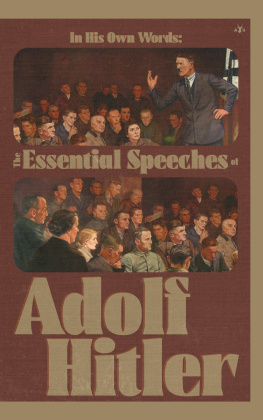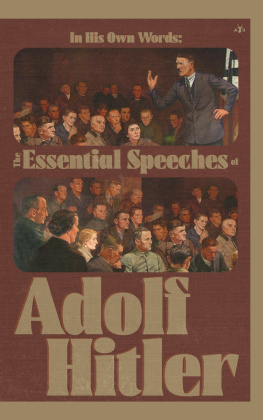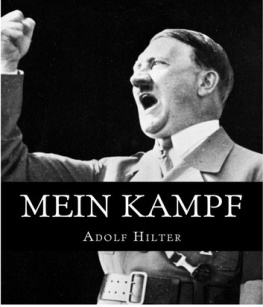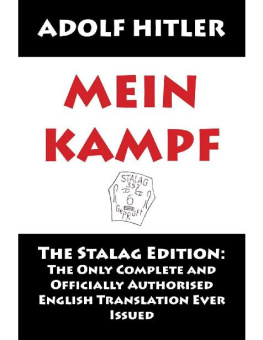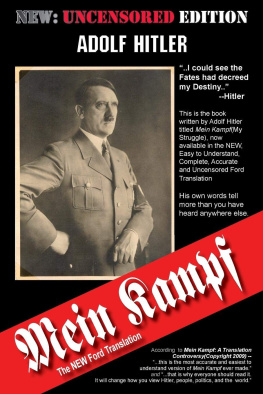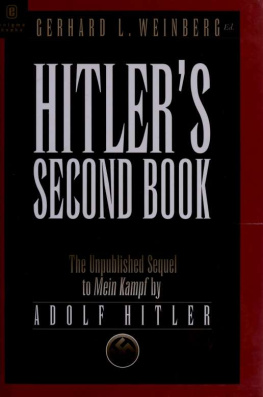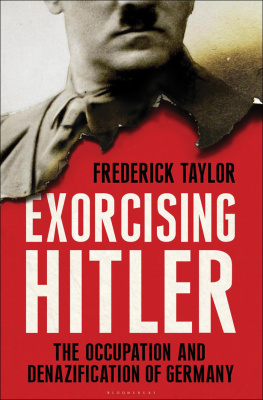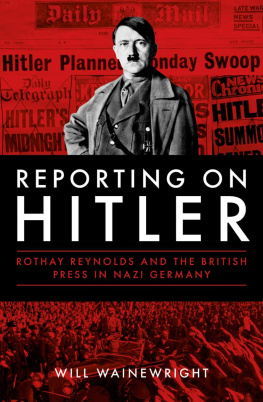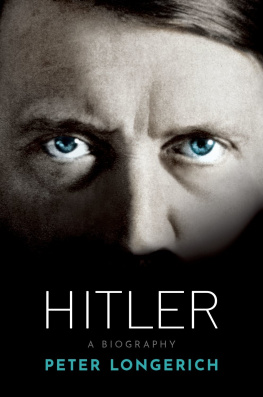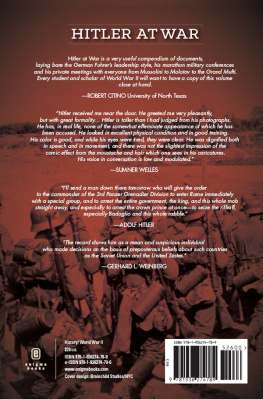Adolf Hitler - In His Own Words
Here you can read online Adolf Hitler - In His Own Words full text of the book (entire story) in english for free. Download pdf and epub, get meaning, cover and reviews about this ebook. publisher: Antelope Hill Publishing, genre: Politics. Description of the work, (preface) as well as reviews are available. Best literature library LitArk.com created for fans of good reading and offers a wide selection of genres:
Romance novel
Science fiction
Adventure
Detective
Science
History
Home and family
Prose
Art
Politics
Computer
Non-fiction
Religion
Business
Children
Humor
Choose a favorite category and find really read worthwhile books. Enjoy immersion in the world of imagination, feel the emotions of the characters or learn something new for yourself, make an fascinating discovery.
- Book:In His Own Words
- Author:
- Publisher:Antelope Hill Publishing
- Genre:
- Rating:3 / 5
- Favourites:Add to favourites
- Your mark:
- 60
- 1
- 2
- 3
- 4
- 5
In His Own Words: summary, description and annotation
We offer to read an annotation, description, summary or preface (depends on what the author of the book "In His Own Words" wrote himself). If you haven't found the necessary information about the book — write in the comments, we will try to find it.
In His Own Words — read online for free the complete book (whole text) full work
Below is the text of the book, divided by pages. System saving the place of the last page read, allows you to conveniently read the book "In His Own Words" online for free, without having to search again every time where you left off. Put a bookmark, and you can go to the page where you finished reading at any time.
Font size:
Interval:
Bookmark:
In His Own Words
The Essential Speeches of Adolf Hitler
I N H IS O WN W ORDS
The Essential Speeches of
A DOLF H ITLER
Translated, compiled, and with commentary by
C.J. Miller

A N T E L O P E ii H I L L ii P U B L I S H I N G
Translation, Compilation, and Commentary Copyright 2022 C.J. Miller
First printing 2022.
Translated from German by C.J. Miller 2022.
Cover art by Swifty.
Cover image: In the Beginning Was the Word by Hermann Otto Hoyer, 1937.
Edited by Rollo of Gaunt.
Formatted by Margaret Bauer.
Antelope Hill Publishing
www.antelopehillpublishing.com
Paperback ISBN-13: 978-1-956887-12-9
Hardcover ISBN-13: 978-1-956887-13-6
EPUB ISBN-13: 978-1-956887-14-3
Dedicated to my fiance, who is my dictionary, my muse, and my partner.
- C.J. Miller
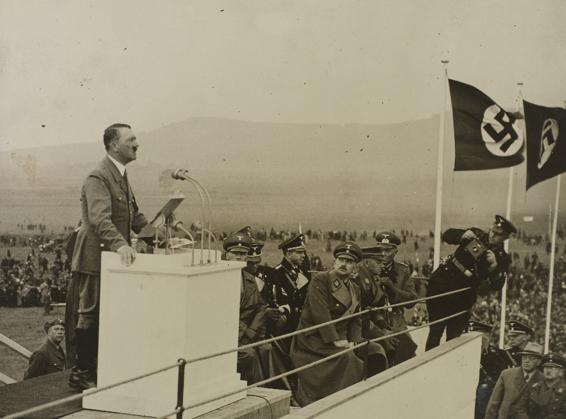
Hitler speaking at a harvest festival in Bckeberg on October 3rd, 1937
C ONTENTS
February 26th, 1924: Hitlers political awakening; the nature and tactics of Marxism; French occupation of the Ruhr; the appeal to the ruling triumvirate in Bavaria to launch a coup; General Ludendorff enters the plot; speeches, pistols, and beer mugs; the Putsch; responsible, but not guilty.
March 27th, 1924: Might versus right; Germanys downfall; leadership as a duty; answering charges of treason; the positive side of the failed putsch.
February 27th, 1925: Why the Party was formed; deep divisions among Germans; the failures of bourgeois nationalism; the importance of women in politics; the current state of the movement; addressing infighting; absolute authority and ultimate responsibility; rebuilding the movement.
The root cause of Germanys distress; the principle of inequality; democracy is to politics what communism is to economics; class and political divisions; the importance of unity; where Germany would be without the Nazis; the power and dedication of the National Socialist movement.
The problems facing Germany (economic depression, unemployment, division, violence); restoring unity; four-year plans; saving the workers and the peasants; economic reforms; Germany and the community of nations; Give us four years!
Misfits and malcontents; questionable promotions of SA officers; lack of education in National Socialist worldview among new SA officers; abuses of newfound power by SA members; plot to disband the Army; Rhm fails to right his wrongs; plotting insurrection; Hitler finally cracks down; the aftermath, the future, and an offer of atonement.
Triumphs of the National Socialist revolution; the economy must serve the people; nationalizing banks and railways; answering allegations of isolationism; German international relations; German rearmament; future plans.
A womens movement in Germany; difference from previous womens and mens organizations; gender antagonism versus gender relations; the importance of women; maximizing manliness and womanliness; helping men and women come together.
Answering allegations of German hostility to religion; German funding for the churches and church privileges; the hypocrisy of secular liberal democracies; no special political privileges for priests; performative sympathy for oppressed dissidentsexcept National Socialist dissidents.
Moscows intentions; preemptive invasion of Russia; the idea of Europe; foreign volunteers; America and Germany; Hitler and Roosevelttwo different life paths; Britain and America sabotage peace proposals; Roosevelts escalations; Germany determined to fight for its rights.
Past obstacles overcome; necessity of struggle and national self-assertion; the folly of pacifism; equal rights and equal duties; the future of the democracies in the face of communism; the duty to resist; the fate of traitors; resistance until final victory.
C.J. Miller
Aside from his controversial historical legacy, and perhaps his iconic moustache, Adolf Hitler is best known for his impassioned, fiery speeches. It should go without saying that this book should not be taken as an endorsement of the content of these speeches or the deeds of the man who made them. It is rather an impartial, scholarly work, and as such is concerned with exploring the craft of his rhetoric, and framing the speeches within the historical context in which they were delivered. With detailed historical background sections outlining events leading up to and surrounding each speech, as well as dozens of explanatory notes embedded within the speeches, this work aims to bridge the gap between three genres which have heretofore remained mostly separate: Hitler biographies, general histories of the period, and Hitler speech collections. As it is aimed at the layman reader and casual student of history, it cannot hope to be comprehensive in any of these areas, but will give the reader a basic grasp of each, as well as introducing novel and insightful anecdotes, all contained within one accessible volume. The aim is not merely to present to the reader a selection of Hitlers spoken words on their own, but to elucidate the historical circumstances in which they were delivered, thus giving the reader insight into why they are significant, and perhaps even what made them effective.
Even the most hostile scholars of the subject have to acknowledge Hitlers oratorical ability, even if they feel the need to insist it was the only thing he was good at doing
Unfortunately, much of the effect is lost by transcribing spoken word into written word. Hitler himself propounded the superiority of speech as a means of reaching people, writing in Mein Kampf:
The force that has ever and always set in motion great historical avalanches of religious and political movements is the magic power of the spoken word. The broad masses of a population are more amenable to the appeal of rhetoric than to any other force. All great movements are popular movements. In no case have great movements been set afoot by the syrupy effusions of literary aesthetes and drawing-room heroes.
In the second volume, he devotes an entire passage to detailing the superiority of speech to writing as a means of swaying an audience, because speech is delivered in real time, and can be adapted on the fly, so that a competent speaker can:
[F]ollow the lead of the broad masses in such a way that he will instinctively speak the words necessary to reach his audiences heart. He can read the facial expression of the audience to see, first, if they understand what he says, second, if they grasp the whole of his speech, and third, to what extent they are convinced of the correctness of what was said.
Good thing, then, that this book is not designed to incite an audience to take political action, but only as a historical inquiry.
Furthermore, Hitlers speeches, especially those that were part of elaborate ceremonies at mass rallies, were visceral aesthetic experiences quite unlike the dry and intellectual experience of reading the same words printed on paper. Even in a crowded beer hall, calculated theatrical flourishes were employed to create a unique atmosphere. Historian and Hitler biographer Ian Kershaw notes:
[H]e used a beer table on one of the long sides of the hall as his platform in order to be in the middle of the crowda novel technique for a speaker which helped create what Hitler regarded as a special mood in that hall.
Despite often speaking for an hour or two at a time, and occasionally more, his speeches are generally described as anything but boring. Kershaw describes how:
Next pageFont size:
Interval:
Bookmark:
Similar books «In His Own Words»
Look at similar books to In His Own Words. We have selected literature similar in name and meaning in the hope of providing readers with more options to find new, interesting, not yet read works.
Discussion, reviews of the book In His Own Words and just readers' own opinions. Leave your comments, write what you think about the work, its meaning or the main characters. Specify what exactly you liked and what you didn't like, and why you think so.

